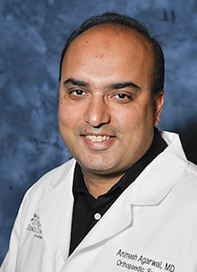We’re accustomed to the idea of encouraging good diets and activity in children to “grow strong bones,” but we tend to think of adult bone as a static framework that holds up our flesh.
It’s not static, and we need to take care of it to avoid fragility fractures and osteoporosis as we age.
“People don’t think of bone as a living organ, but it is,” said Dr. Animesh Agarwal, director of the orthopedic trauma follow-up clinic at University Health and professor of orthopedic surgery at UT Health San Antonio.
And that living organ can grow and regenerate throughout our lives – albeit more slowly over time, and often pitted against the weakening effects of osteopenia, and then eventually, osteoporosis.
Osteoporosis and Fragility Fractures
Osteoporosis literally means "porous bones." As we age, some of our bone cells start to dissolve, even as new bone cells form. It’s called remodeling.
But with osteoporosis, the new bone cell formation doesn’t keep up with the dissolution, and the bones weaken and become more vulnerable to fractures and breaks. Fragility fractures are defined as those that happen when a person falls from a standing height or less. This risk is greatest in post-menopausal women, Dr. Agarwal said, in part due to the hormonal shifts they experience with menopause.
“For a post-menopausal female at 65, the risk is as high as for a male at age 80,” Dr. Agarwal said.
According to the National Institutes of Health, annual hip fracture rates in the United States are highest in white women, followed by Asian women, African American women, and Hispanic women. But as we age, it can happen to anyone.
Own the Bone Program at University Health
Most osteoporosis isn’t diagnosed until someone shows up with a fracture, Dr. Agarwal said, but even then it’s not too late to improve your bone health and prevent future breaks.
One way to do this is through the Own the Bone program, operated through Dr. Agarwal’s clinic.
Set up by the American Orthopaedic Association, clinic staff work with eligible patients to manage their bone health and prevent future fractures. This can involve:
- education on nutrition and lifestyle changes
- recommendations on bone mineral density testing, and
- pharmaceutical treatment when appropriate.
“We’ve made that commitment as an organization to really become the complete musculoskeletal care provider,” Dr. Agarwal said.
Prevention Is the Best Medicine
The best medicine for osteoporosis throughout life is the same as what most doctors prescribe for general good health: more exercise, including weight-bearing work, and good nutrition. In some cases, weight loss or reduced alcohol intake is recommended.
Smoking and tobacco use has been shown to increase the risk for fractures, so quitting that can improve bone health. For bones, most people need more vitamin D and calcium, Dr. Agarwal said, although the reasons why are not entirely clear.
“I don’t think we have a good grip on why people’s vitamin D is horrible,” Agarwal said, “Even those who drink fortified milk or spend a lot of time outside (getting sunlight, another source of vitamin D).”
Even the specialist isn’t immune. “I’m on supplementation from my primary care physician, and I’ve never had a fracture,” Dr. Agarwal said.
Medication & Vitamin D
Vitamin D and calcium are part of an elaborate system of bone metabolism, he said, but there are medications for people who are at high risk for fragility fractures. Bisphosphonates and teriparatide can both help, he said, but for different reasons neither should be taken for life.
Hormone therapy for women can affect bone health, but is a complex process with lots of different effects and is usually managed by a gynecologist.
Call the Bone Frailty Clinic at University Health
While appointments at the Bone Frailty Clinic require a physician’s referral, for more information people can call 210-743-2900.




